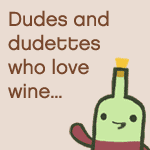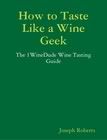 You can all stop picking on Robert Parker now.
You can all stop picking on Robert Parker now.
The oft-followed and just as oft-maligned wine critic extraordinaire is doing you a favor.
A favor if you, like him, have a wine palate that tends towards the bombastic, that is.
A great post on the science of wine tasting over at Catavino.net (and how that science can be manipulated) got me thinking about the subjectivity of wine critiquing in general, and more specifically on the philosophical question: Can wine tasting can ever be totally objective?
So for this topic, you can view this article as the yin to Catavino.net's yang. The conclusion of all of my philosophical pondering? All y'all need to cut Robert Parker some slack!
To bolster my exclamatory claim, let's turn to the (not too difficult) task of finding someone smarter than me to explain it...
According to Tim Crane's essay in Questions of Taste: The Philospohy of Wine:"A wine cannot be appreciated for its intrinsic value unless it is drunk; the value of the wine is intimately related to the kinds of experience to which it gives rise."
 In other words: the trouble with appreciation is that you need to taste wine to appreciate it (well, I suppose for some of us it's not really too much trouble). And because tasting itself is such a subjective act, it suggests that wine tasting is also at least somewhat subjective.
In other words: the trouble with appreciation is that you need to taste wine to appreciate it (well, I suppose for some of us it's not really too much trouble). And because tasting itself is such a subjective act, it suggests that wine tasting is also at least somewhat subjective.
Does our tasting subjectivity preclude us from coming to some general consensus of how a wine tastes, or its relative quality? Probably not. Throughout history, what was generally considered "good" wine has changed substanitally. In another essay from Questions of Taste, Barry C. Smith puts it like this:"Saying that the experience of tasting is a personal one need not prevent us from saying that it acquaints us with how a particular wine tastes, or from supposing that other people can be acquainted with that taste too."
Man, I am really digging smart philosophers right now! What does all of this have to do with wine critics like Parker? It suggests 2 things:
There are studies that back this up. Vinography.com recently reported on two such efforts that compare wine reviews by major wine critics (including Parker, of course) - with different taste preferences. These critics have been in very close agreement on which Bordeaux wines have been the best, and they've been agreeing for decades. So there's gotta be something to the "collective" wine palate as well as to our individual, subjective ones.
Back to Questions of Taste - also from Smith's essay:"Having the ability to asses and describe wines in one thing; having certain personal tastes is another. That we, and the wine critics, have personal tastes does not imply that all taste is subjective... Wine critics understand that they cannot overrule an individual's personal tastes... The moral is that we must find the right critic to advise us, the one whose personal tastes or preferences are more nearly aligned with ours."

So - we're all Right, and we're All right. Dig it.
Now give Parker a break. He's just trying to help out the people who like the fruit bombs. Including himself.
Cheers!
(images: palmspringslife.com, tuscany-cooking-class.com, winechocolate.org)
Stop Picking on Robert Parker (the Subjectivity of Wine Tasting)
Related Articles (Sphere)
Vinted on
Tuesday, July 01, 2008
Email This
![]()
Labels: best of, commentary, robert parker, wine tasting
Subscribe to:
Post Comments (Atom)



























13 comments:
I just don't buy into the "we're all so different and wine is oh-so subjective" line.
It's nice and touchy-feely to say we are all right. But we are not.
The differences in sensory physiology are 1) not all that huge and 2) over-hyped by the people who most benefit from the hype:
1) researchers who must publish or perish, 2) wine producers who make wine of dubious quality and 3) uninformed and untrained critics who fear losing influence or facing being proven wrong.
I agree, Arthur, to a point. There is certainly evidence to suggest that we bring subjectivity to our wine tasting experiences. And there is just as much evidence (in my view) that some aspects of wine tasting are 'universal' (in so much as our collective cultural tastes allow them to align).
So, most of us will agree that a particular Sauv. Blanc is really good, and most of us will taste the citrus & minerals. Some of us might get one type of citrus, some of us another - the fundamental part will be what can be shared.
And none of it will mean anything to the people that just hate the all-around taste of Sauv. Blanc anyway :-).
My point in the first comment is that "Some of us might get one type of citrus, some of us another" is a factor of experience and brain training - not olfactory receptors or taste buds.
I try not to get frustrated by the tendency of wine bloggers to follow this “there is scientific evidence that we taste differently” or “scientific evidence that there is an inextricable subjective element to tasting”. The fact is that there is as much if not more scientific evidence that we are able to separate subjective preferences from objective observations. That separation is critical to objective descriptions and fair judging.
A true and reliable critic describes any wine in a way that separates the description and assessment from his/her own preferences. This paves the way for the reader to make their own decision. (Unless, of course, that reader needs/wants to be told what they like.)
We review wines all the time. Our goal to to provide our readers with wines we feel will meet their expectations. We only post wine reviews on wines we feel are Very Good or better. We also consolidate the scores from 8 other professionals. I like to say the most important number on my website is the number of professional recommendations. If 3 or 4 professionals (who taste a lot of wine)think this wine is Very Good or better, then you are likely to be very satisfied. Whether you think the wine is Excellent or Very Good.
A good Wine Reviewer (I hate the word critic since I only recommend wines) in my opinion guides his readers to wines that they will more than likely enjoy. If he or she is good at doing that then they will develop a following. (Obviously Parker has been successful) These days, no one should have to drink a Bad or even just a Good bottle or glass of wine. There is just to much Very Good or Better stuff out there. If someone can help you find those wines, then it a could tip. Cheers - Ken
Thanks, Ken - fantastic insight: "These days, no one should have to drink a Bad or even just a Good bottle or glass of wine. There is just to much Very Good or Better stuff out there."
I couldn't agree more. There are about 7,000 wine brands available right now in the U.S. alone - no one should have to settle for plonk ;-).
I have spent more than a decade teaching people about wine, and listening to how they talk about what they were tasting. Taste may well be subjective, but there are some common shared experiences and most of these have to do with balance. The amount of perceived acidity, for example, tends to be something that everyone can agree on.
I decided that part of the problem with wine writers, including myself, was the language we used. I looked at the terms that my students have the greatest resonance with and promoted the use of these more universal expressions in my book and my classes.
I have had great success employing this reduced lexicon. I am convinced that most wine writers are doing a disservice to wine and their readers by over reaching. Keep it simple, keep it universal. Eschew fruit basket terms for something that everyone understands.
I am not saying that everyone must kowtow to my way of talking about wine, but it would be nice.
Just as a parting shot to all wine critics (including myself) I have always stressed to my readers that they should trust their own taste above all else. Wine writers may get to taste more wines, but that doesn't make us "right." If you find a writer that shares your taste, then great, but don't ever be put off if someone famous likes a wine you don't and vice versa.
Well put, wineguy! One of the reasons I decided to write wine reviews via twitter was to force myself to limit the vocab.
With only 140 chars (& only about 25 chars left after typing in the names of a German wine!), you gotta go for the universal descriptors.
"I just don't buy into the "we're all so different and wine is oh-so subjective" line."
You've never sat at a table between a Francophile and a lover of "New World Cabs" (need a term for that). If their differnt opinions on tasting each others favorites can't be explained by subjectivity, then what is it?
Jason:
Francophile and "lover of New World Cabs"' is a *point of preference*.
That is distinct and separate from the fact that humans don't really differ all that much when it comes to their physiology.
Great discussion - my belief is that the problem is not with the reviewers/critics, it's with the 100 point system. No matter what Parker et al. say, there will always be those who pay no attention to the words and just say, "give me the 90+ wine." Silly, but I see it all the time. Even Gary V, who professes to be doing something different, uses the same lame system. I say use all the language you can for descriptions, but get rid of a shortcut number system. It's a crutch that we no longer need!
Thanks, Mark.
I agree - points suck. There's even an on-line group dedicated to the anti-points movement over @ OpenWineConsortium.org!
wine is subjective. nuff said, oh wait no it's not! Our collective western wine loving culture may agree on some standards in this era of wine consumption thus creating an aura of objectivity, but give it a hundred years. Tastes will be different. Or better yet go to a wine show in another country. Different cultures, the most obvious being countries who have no wine culture, have tastes that differ and what is positive there is often different here. I agree you can objectively tell if a wine is oxidized, or tainted, but what about a lauded bretty Burgundy or a nice oxidized sherry? I've had oxidized chards, that if served in a bottle marked Jerez would have been held up as great wines, but instead were dumped down the sink as flawed.
do not confuse the small objective details that exsist with the subjectiveness of current fashion in tastes/flavors. Over oaked chards are loved and hated. Sherry is thought to be undrinkable by some, and the pinnacle of excellence by others(critics take both sides).
If you need to educate someone to understand what is objectively correct you are proving my point. Primarily because education itself is subjective when it comes to interpretations. Math:Objective History:Subjective
Flavors are subjective and culturally specific(if not we'd all love chocolate covered ants and rotting fish). What we call objectively correct today will tomorrow or a hundred years from now considered an oddity.
I can teach todays objective standards, and I do, but I do not claim that they are such. They are our culturally accepted, subjective, norms
my two cents have been spent... :)
Thanks Ryan - a fine 2 cents it was!
Post a Comment